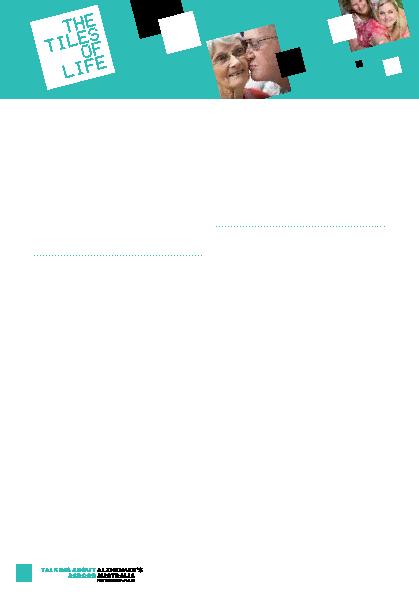
took photographs which were uses as an
interview aid, to record and communicate
their experiences and thoughts. It allows
others to see the journey through their eyes.
Journals were also used to create an individual
and permanent record of their workplace
experience.
and challenges of using Photovoice as an
evaluation strategy for individuals with younger
onset dementia.
sPaNisH sPEakiNg CaRERs
A Molina, L Chen, H Kyriazopoulos,
D Gallagher-Thompson, L Thompson
and education programs, there are no specific
interventions targeting CALD carers. There
are few support programs available for CALD
families caring for a relative with dementia.
Some of these are delivered by bilingual
staff and participants may be provided with
translated information, yet there has been little
investigation of whether the programs are
culturally appropriate or effective in assisting
CALD caregivers.
Cognitive Behavioural Therapy (CBT) program
developed for Chinese and Spanish speaking
Carers was adapted to the Australian context.
Bilingual health professionals were employed
in NSW and SA to tailor and deliver the CBT
based intervention to their communities.
Training and ongoing support was provided
by the North American authors. The project
Research Centre- Assessment and Better Care
grant.
adapting the intervention, partnerships with
NGOs, collaboration between stakeholders and
recruitment of participants. Preliminary results
will be presented and future implications
discussed.
bEiNg
Palliative and Supportive Services School of
Medicine Flinders University
Dr Sandra (Sam) Davis
Palliative and Supportive Services School of
Medicine, Flinders University
which supports the benefits resultant from a
person centred approach within long term care
settings. There is also a burgeoning body of
work being done on knowledge translation and
how evidence can be applied in practice within
these settings; why then is there a dominance
of a biomedical model of care, when evidence
clearly indicates a biomedical model is not
`best practice'? The Australian Government
Department of Health and Ageing, Encouraging
Best Practice in Residential Aged Care Program
funded a two year study involving aged care
facilities in seven locations. The project was
aimed at implementing existing evidence
specific to creating dementia friendly physical
and social environments, and to facilitate
best practice in addressing behaviours of
concern. The project incorporated several tools
for evaluation, one of which was Dementia